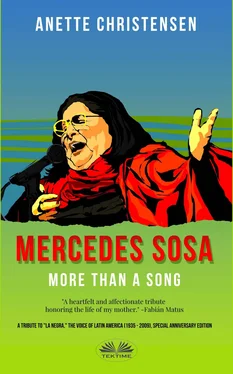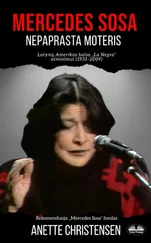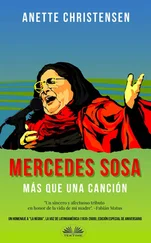Mercedes never regrets her decision about getting an abortion, but she nonetheless feels guilt over it frequently.
THE FINANCIAL pressure, their unpredictable lifestyle, raising a child, their disagreements over politics, and Oscar’s jealousy—which is causing him to mistreat her—is forcing her to question if she can keep her vows and stay in the marriage. 4She is desperate to get out but is caught in a bind. She has always been a “good girl.” She hadn’t had sex with anyone before she got married, and she has never been unfaithful to her husband. According to the norms of the time and the traditional values of the area, she has grown up believing that good girls don’t get divorced. Even so, she is considering another hard decision that goes against her values and her loyal personality. But while she’s deliberating, she learns that Oscar has been unfaithful and wants to leave her for another woman. He makes the decision for her, easing her conscience. But she still feels humiliated and finds it hard to accept that he has abandoned her. Hatred is not a feeling she normally possesses, but Mercedes feels hatred toward the other woman for the rest of her life. “I did not leave the marriage. He abandoned me. A Tucumána girl marries for life. That destroyed me.” 4
Mercedes and Oscar have been married for eight years when Mercedes, thirty years of age, finally accepts that the marriage is leading to a dead end and consents to the breakup.
After the divorce, she feels heartbroken and lonely. She doesn’t even have a permanent place to stay and moves from one small pension to another with Fabián, who is now seven. Eventually, she decides to send Fabián to live with her parents in Tucumán. Her income comes from singing at nightclubs in Buenos Aires, but she doesn’t earn enough and has to get loans from some of her friends in order to survive. When the time comes to pay her friends back and she asks how much she owes, they all answer with variations of the rejoinder, “What money?” She is deeply moved by the sense of solidarity shown by her friends, who are artists struggling to make ends meet as well.
In 1965, Mercedes makes a significant step forward in her career. Thanks to the support of a very popular Argentine singer, Jorge Cafrune, who invites her to sing at the national folk festival in Cosquin , she gets a national breakthrough. At first, the festival committee doesn’t want her to sing as they consider her a communist, but Jorge Cafrune insists. Standing on the stage with her arm around Fabián, who she brings along whenever she can, she gives her thanks to Jorge Cafrune and the committee for the opportunity to sing. The song that provides her biggest breakthrough is almost prophetic, its lyrics ominously pointing toward what she is about to face.
Night is coming to me in the middle of the afternoon,
But I don’t want to turn into shadows,
I want to be light and stay. 4
IN 1967, a new life is taking shape. Professionally, Mercedes is being introduced on the big international stages. She gives concerts in Miami, Rome, Warsaw, Lisbon, Leningrad, and many other cities. She becomes engaged to Francisco Pocho Mazzitelli, her manager, whom she had developed a friendship with while still being married to Oscar. In the beginning, he was just a very good, supportive friend, but the friendship has grown into love. He becomes crucial for the way Mercedes develops as a musician, as he likes many different genres and introduces her to both classical music and jazz. Their relationship helps keep Mercedes from becoming further depressed and lonely after her divorce. Francisco, or Pocho as she calls him, pulls her out of the darkness and Mercedes realizes that she has to hold onto him to stay in the light. 4They decide to get married in 1968. Pocho is a couple of years older than Mercedes, and he gives her the stability and peace she never experienced in her marriage with Oscar. He ends up being the love of her life, her true partner, and a substitute father for Fabián. He is also there supporting her through her grief when her father dies suddenly of a heart attack in June 1972, at the age of sixty-two. 8
AS THE popularity of the New Song Movement grows among the working class, it becomes a real threat to the ruling dictatorships across the continent. Soon many of its artists face political oppression—censorship, persecution, intimidation—and some are forced into exile. One of the leaders of the movement in Chile, Mercedes’ good friend Víctor Jara, comes out in support of Salvador Allende for president. In 1970, Allende is inaugurated as the first socialist head of state in a Latin American country elected by democratic means. When he steps out in front of the masses to be paid tribute for the first time, there is a banner hanging behind him that says, “It is not possible to have a revolution without singing.”
Víctor Jara participates in all of Allende’s political meetings. He gives free concerts in support of the government and tours all over the world, highlighting to the audience Chile’s peaceful way to socialism. However, after a bloody coup on September 11, 1973 , the military, led by the commander in chief Augusto Pinochet, removes Allende, who dies of unknown causes during the attack on the presidential palace.
At that same time, Jara is at the technical university in Santiago, where he is a teacher. The university lies only some hundred meters away from the presidential palace and is surrounded by the military, so no one can get out. Víctor calls his English wife, Joan, from the university and tells her to stay inside the house with their two girls until the fighting is over. He tells her he will spend the night at the university with other teachers and students and return home in the morning. They declare their love to each other before he hangs up. It is the last time she hears his voice. In the morning, the students and the teachers are attacked by the military, and, together with thousands of other pro-Allende Chileans, they are led to the national soccer stadium, Estadio Chile. Here Jara is tortured. First they force him to sing and play his guitar. Then they cut his hands off with an axe before killing him with forty-four shots in the head, chest, arms, and legs. A few days later, Joan finds his body in a ditch outside of Santiago. 14
Конец ознакомительного фрагмента.
Текст предоставлен ООО «ЛитРес».
Прочитайте эту книгу целиком, купив полную легальную версию на ЛитРес.
Безопасно оплатить книгу можно банковской картой Visa, MasterCard, Maestro, со счета мобильного телефона, с платежного терминала, в салоне МТС или Связной, через PayPal, WebMoney, Яндекс.Деньги, QIWI Кошелек, бонусными картами или другим удобным Вам способом.












